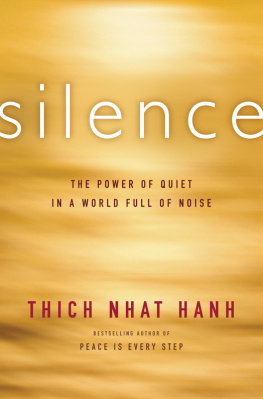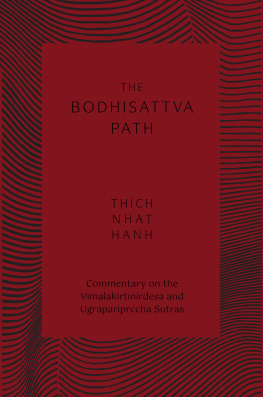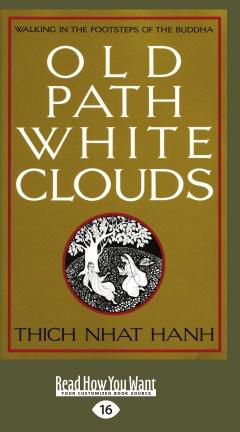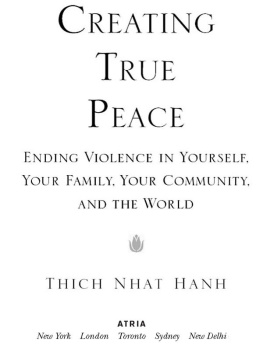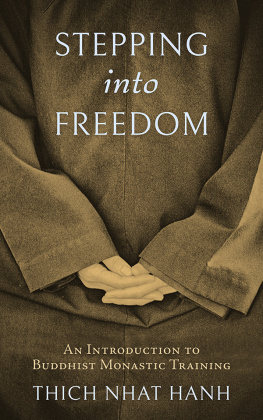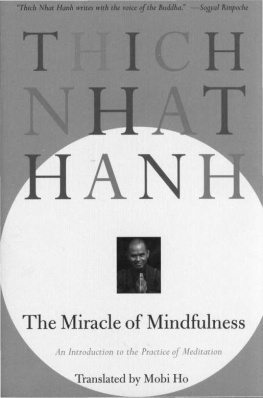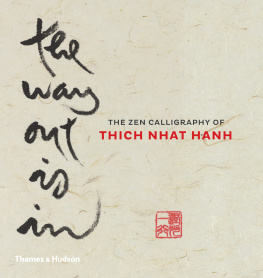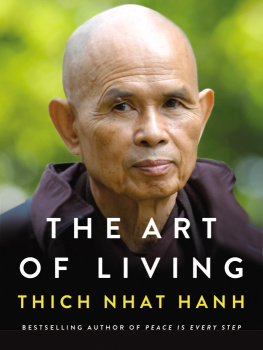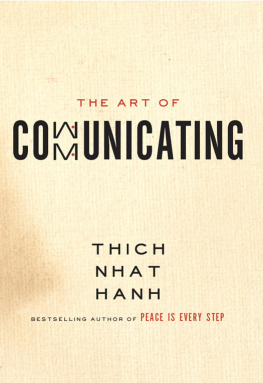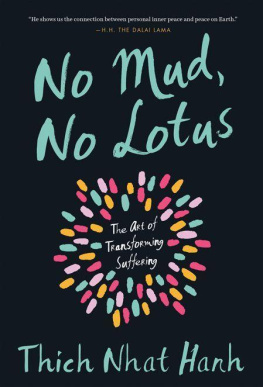No Death, No Fear
Living Buddha, Living Christ
Fragrant Palm Leaves
Being Peace
For a Future to Be Possible
The Heart of the Buddhas Teaching
The Heart of Understanding
The Long Road Turns to Joy
Love in Action
The Miracle of Mindfulness
Old Path, White Clouds
Peace Is Every Step
Anger
True Love
The Art of Power
Savor
Peace Is Every Breath
The Novice
Fear
The Art of Communicating
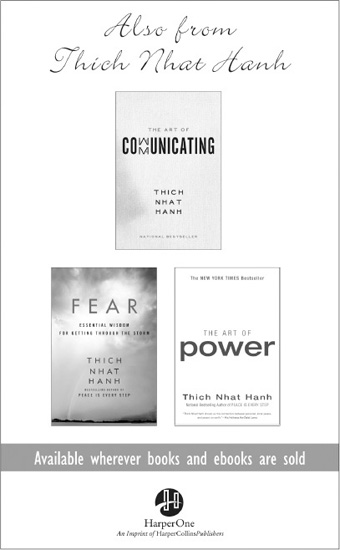
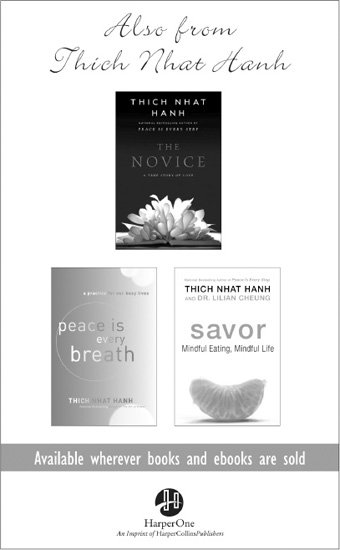
U nless you live alone in the mountains without electricity, chances are youre absorbing a constant stream of noise and information all day long, without interruption. Even if no one is speaking to you and youre not listening to the radio or some other sound system, there are billboards, telephone calls, text messages, social media, computer screens, bills, flyers, and many other ways that words and sounds reach us. It sometimes can be impossible to find a corner of an airport boarding area without a television blaring. Many peoples morning commute is spent absorbing tweets, texts, news, games, and updates on their phones.
Even in those rare moments when there is no sound, text, or other information coming in from outside, our heads are filled with a constant loop of thoughts. How many minutes each day, if any, do you spend in true quiet?
Silence is essential. We need silence,
just as much as we need air,
just as much as plants need light.
If our minds are crowded with
words and thoughts, there is
no space for us.

People who live in an urban setting get used to a certain level of ambient noise. Theres always someone shouting, traffic honking, or music blaring. The constancy of perpetual noise can actually become reassuring. I know friends who go to the countryside for a weekend, or who go to a meditation retreat, and find the silence scary and unsettling. The silence doesnt feel safe or comfortable because they are used to a background of constant noise.
Plants cant grow without light; people cant breathe without air. Everything that lives needs space to grow and to become.
fear of silence
I have the impression that many of us are afraid of silence. Were always taking in somethingtext, music, radio, television, or thoughtsto occupy the space. If quiet and space are so important for our happiness, why dont we make more room for them in our lives?
One of my longtime students has a partner who is very kind, a good listener, and not overly talkative; but at home her partner always needs to have the radio or TV on, and he likes a newspaper in front of him while he sits and eats his breakfast.
I know a woman whose daughter loved to go to sitting meditation at the local Zen temple and encouraged her to give it a try. The daughter told her, Its really easy, Mom. You dont have to sit on the floor; there are chairs available. You dont have to do anything at all. We just sit quietly. Very truthfully the woman replied, I think Im afraid to do that.
We can feel lonely even when were surrounded by many people. We are lonely together. There is a vacuum inside us. We dont feel comfortable with that vacuum, so we try to fill it up or make it go away. Technology supplies us with many devices that allow us to stay connected. These days, we are always connected, but we continue to feel lonely. We check incoming e-mail and social media sites multiple times a day. We e-mail or post one message after another. We want to share; we want to receive. We busy ourselves all day long in an effort to connect.
What are we so afraid of? We may feel an inner void, a sense of isolation, of sorrow, of restlessness. We may feel desolate and unloved. We may feel that we lack something important. Some of these feelings are very old and have been with us always, underneath all our doing and our thinking. Having plenty of stimuli makes it easy for us to distract ourselves from what were feeling. But when there is silence, all these things present themselves clearly.
a smorgasbord of stimuli
All the sounds around us and all the thoughts that were constantly replaying in our minds can be thought of as a kind of food. Were familiar with edible food, the kind of food we physically chew and swallow. But thats not the only kind of food we humans consume; its just one kind. What we read, our conversations, the shows we watch, the online games we play, and our worries, thoughts, and anxieties are all food. No wonder we often dont have space in our consciousness for beauty and silence: we are constantly filling up on so many other kinds of food.
There are four kinds of food that every person consumes every day. In Buddhism, we call these kinds of food the Four Nutriments. They are edible food; sense impressions; volition; and consciousness, both individual and collective.
The edible food is, of course, the food that you eat with your mouth every day. The second food, sense impressions, is the sensory experiences you receive through your eyes, ears, nose, tongue, body, and mind. This includes what you hear, what you read, what you smell, and what you touch. It includes your phone and text messages, the sound of the bus outside your window, and the billboard you read as you pass by it. Although these things are not edible food, they are information and ideas that come into your consciousness and you consume them every day.
The third source of nutriment is volition. Volition is your will, your concern, your desire. This is food because it feeds your decisions, your actions, and your movements. Without any volition, without any desire to do anything, you wouldnt move; you would simply wither.
The fourth kind of food is consciousness. This food includes your individual consciousness and the way your mind feeds itself and feeds your thoughts and actions. It also includes collective consciousness and how it affects you.
All of these foods can be healthy or unhealthy, nourishing or toxic, depending on what we consume, how much we consume, and how aware we are of our consumption. For example, we sometimes eat junk food that makes us sick, or drink too much when were upset about something, in the hopes of distracting ourselves even if afterward that consumption makes us feel worse.
We do the same thing with the other nutriments. With sensory food, we may have the awareness to take in media that are wholesome and enlightening, or on the other hand we may use video games, movies, magazines, or even engaging in gossip in order to distract ourselves from our suffering. Volition can also be healthy (constructive motivation) or unhealthy (craving and obsession). Likewise, collective consciousness can be healthy or unhealthy. Think of how affected you are by the mood or the consciousness of the group you are in, whether that group is supportive, happy, angry, gossipy, competitive, or listless.
Because each nutriment affects us so deeply, its important to be aware of what and how much we are consuming. Our awareness is the key to our protection. Without protection, we absorb far too many toxins. Without realizing it, we become full of toxic sounds and toxic consciousness that make us ill. Mindful awareness is like a sunscreen protecting the sensitive skin of a newborn baby. Without it, the skin would blister and burn. With the protection of our mindfulness, we are able to stay healthy and safe and take in only those nutriments that help us thrive.

